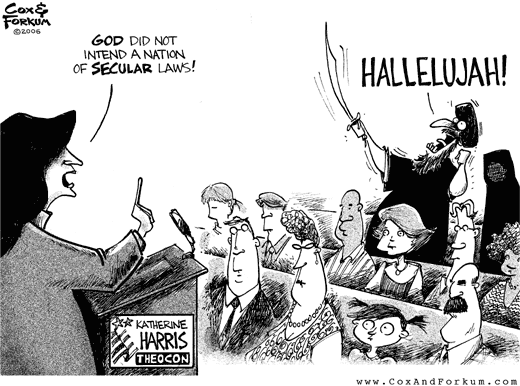It's a familiar trope, one that we've all heard at one point in time or another: that atheism is synonymous with communism.
It's trotted out with such regularity, that I imagine the religious blogger (most of whom live in their own little unexplored worlds) probably physically flinches when the conversation explodes into vitriol.
Hey, I myself have been accused of being a 'Neo-Marxist' on occasion. Me, a red-blooded American capitalist. Then of course, in an effort at 'Turnabout is fair play', the religious blogger will inevitably march out all the outrages of an 'atheistic' government - Stalin, Pol Pot, Mao, etc. Y'all know the drill.
(As if the concept of a stern cosmic overseer ever kept anybody in check. Gimmee a break!)
They always skip over the real black eye, the French Revolution. There's no getting around that one, folks. No amount of apology. It's up to us to make sure that sort of event never occurs again.
The rest of it's all apples-to-oranges. Stalin relied on Tsarist absolutism. Mao had the big idea that everything should get bulldozed, and start again. And etcetera, etcetera, etcetera. Nobody did it in the 'name of atheism'.
But who got it all started? Where did it all begin?
That old whore, Christianity, that's who. Dropped another squalling infantile concept into our laps.
Read on:
Christian Communism is a form of religious communism centered around Christianity. It is a theological and political theory based upon the view that the teachings of Jesus Christ compel Christians to support communism as the ideal social system. Although there is no universal agreement on the exact date when Christian communism was founded, many Christian communists assert that evidence from the Bible suggests that the first Christians, including the Apostles, created their own small communist society in the years following Jesus' death and resurrection. As such, many advocates of Christian communism argue that it was taught by Jesus and practiced by the Apostles themselves.
Share and share alike. As I told a secular Democratic Socialist Jew in 2006, "Communism's a great idea, if people knew how to share."
Christian communism can be seen as a radical form of Christian socialism. Also, due to the fact that many Christian communists have formed independent stateless communes in the past, there is also a link between Christian communism and Christian anarchism. Christian communists may or may not agree with various parts of Marxism. They certainly do not agree with the atheist views of most Marxists, but they do agree with some of the economic aspects of Marxist theory, such as the idea that capitalism exploits the working class by extracting surplus value from the workers in the form of profits. Christian communists also share some of the political goals of Marxists, for example replacing capitalism with socialism, which should in turn be followed by communism at a later point in the future. However, Christian communists sometimes disagree with Marxists (and particularly with Leninists) on the way a socialist or communist society should be organized. In general, Christian communism evolved independently of Marxism, and most Christian communists share the conclusions but not the underlying premises of Marxist communists.
So, where did it all start? Yep, you guessed it: the New Testament:
Christian communists trace the origins of their practice to the New Testament book Acts of the Apostles at chapter 2 and verses 42, 44, and 45:
42 And they continued stedfastly in the apostles' doctrine and in fellowship [...] 44 And all that believed were together, and had all things in common; 45 And sold their possessions and goods, and parted them to all men, as every man had need. (King James Version)
The theme is reiterated in Acts 4:32-37:
32 And the multitude of them that believed were of one heart and of one soul: neither said any of them that ought of the things which he possessed was his own; but they had all things common. 33 And with great power gave the apostles witness of the resurrection of the Lord Jesus: and great grace was upon them all. 34 Neither was there any among them that lacked: for as many as were possessors of lands or houses sold them, and brought the prices of the things that were sold, 35 And laid them down at the apostles' feet: and distribution was made unto every man according as he had need. 36 And Joses, who by the apostles was surnamed Barnabas, (which is, being interpreted, The son of consolation,) a Levite, and of the country of Cyprus, 37 Having land, sold it, and brought the money, and laid it at the apostles' feet. (King James Version)
Anyone who's actually read the wholly bibble, can find all sorts of anti-capitalist propaganda, say like, "It is harder for a rich man to enter the kingdom,", or the exhortation of the merchant to sell everything and come follow. It's everywhere in that allegedly 'good' book.
And save this up your sleeve, the next time some mumbo-jumbo mumbler starts in about the 'Pilgrims founding this country in search of religious freedom' (which is a daft load of shit, since New Amsterdam preceded the 'fated landing' in 1626, and the Spaniards had colonized most of the West coast prior to their arrival. Hey, they were nutters, England wanted to see the back of them, receding):
The Plymouth Colony, traditionally identified as the first American settlement, was established by pilgrims who had travelled from Europe in order to flee religious persecution and search for a place to worship as they saw fit. The social and legal systems of the colony were thus closely tied to their religious beliefs.
In this highly religious, close-knit community, communist-like principles were tested by the settlers. In 1621, William Bradford, primary drafter of the Mayflower Compact, was selected as governor of the group and served in that capacity for the next 30 years. During that time, Bradford kept a journal which is now known as Of Plymouth Plantation, the single most complete authority for the story of the Pilgrims and the early years of the Colony they founded.
[...]
Due to all of the troubles that resulted from the Plymouth communist-like economy (lack of production and general discontent), Bradford relates the decision to stop the communal living and contrasts it to the successful capitalist-like economy that was ultimately practiced at Plymouth (and eventually became the standard economy practiced by the United States):
The Diggers in 1649 tried it as well in England.
And interestingly enough, those wild and wooly Mor(m)ons:
In the 1800s the The Church of Jesus Christ of Latter-day Saints, colloquially called Mormons, practiced a voluntary form of Christian socialism in Orderville, Utah under Prophet Brigham Young. Although the Church never called this practice "socialism", the United Order( also known as the Law of Consecration) was an attempt to base income on family situation and need on a voluntary basis or covenant (see also Mormon beliefs on free agency), thereby going against centuries of thinking that expounded the establishment of economic equality through force. The Church has formally stated that the United Order and communism are, in reality, exact opposites:
"Communism and all other similarisms bear no relationship whatever to the United Order. They are merely the clumsy counterfeits which Satan always devises of the Gospel plan [...]. The United Order leaves every man free to choose his own religion as his conscience directs. Communism destroys man's God-given free agency; the United Order glorifies it. Latter-day Saints cannot be true to their faith and lend aid, encouragement, or sympathy to any of these false philosophies [...]." ("Message of the First Presidency," 112th Annual Conference, April 6, 1942.)
Called 'doing the right thing for all the wrong reasons', as the homily goes.
Was there a communist theocracy? Why, yes there was!
Early in the Protestant Reformation in 1524, Thomas Müntzer, a German pastor and contemporary of Martin Luther, attempted to establish a communist theocracy in Mühlhausen, Thuringia. Müntzer was an ardent proponent of the use of force and revolutionary methods in order to establish a classless society where all would share their goods - his war cry was "let not your sword grow cold from blood." Because Luther had recently begun the non-violent revolution against the Catholic establishment, Müntzer and his supporters looked to him for support of their fledgling movement. But due to the many atrocities that were committed, often in Luther's name, by the peasantry in the revolution - the Peasants' War in 1524 to 1525 - Luther, although sympathetic to their cause, was extremely at odds with their violent methods and severely admonished them for this in his "Against the Murderous, Thieving Hordes of Peasants" (1525). Eventually, Müntzer and Luther parted paths over this disagreement and Müntzer ultimately established his communist theocracy in Mühlhausen during the Peasants' War. This communist government was short lived. The ecclesiastical and secular governments eventually joined forces against the rebels and put an end to the revolutionary government with Müntzer's execution by beheading, in May 1525. Before he died, Müntzer recanted and accepted the Roman Catholic mass. His head and body were displayed as a warning to all those who might again preach treasonous doctrines.
There's more reading in the link provided.
Now, I am a proponent of socialist medicine, inasmuch as I don't think health care should be based on pay scale. And I'm all for giving shelter to the homeless. But that's about the extent of it. Luxuries versus privileges, all that. You want extra? You should work for it.
I think that's enough info to beleaguer the more bombastic of the bible-thumpers. So, another flash-card up our collective sleeves.
That, dear readers, is my nickel's worth. Flip it heads or tails, sock it away for a rainy day, or spend it wisely.
Till the next post then.
















